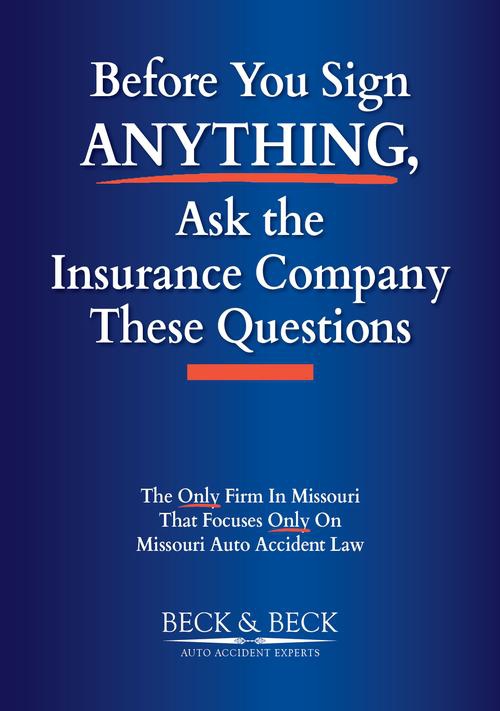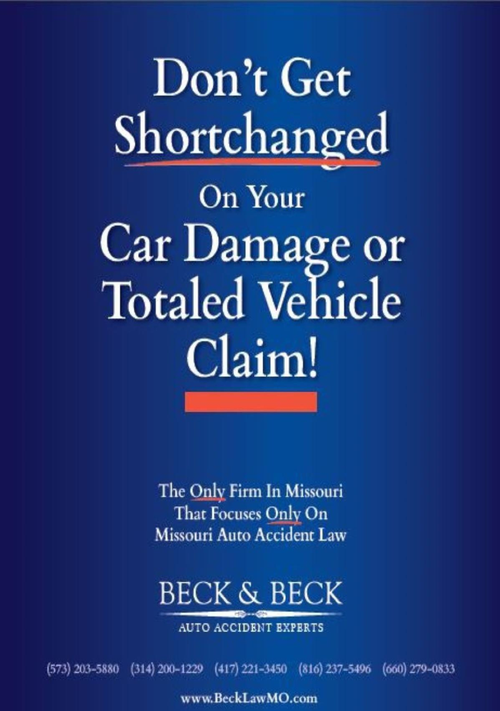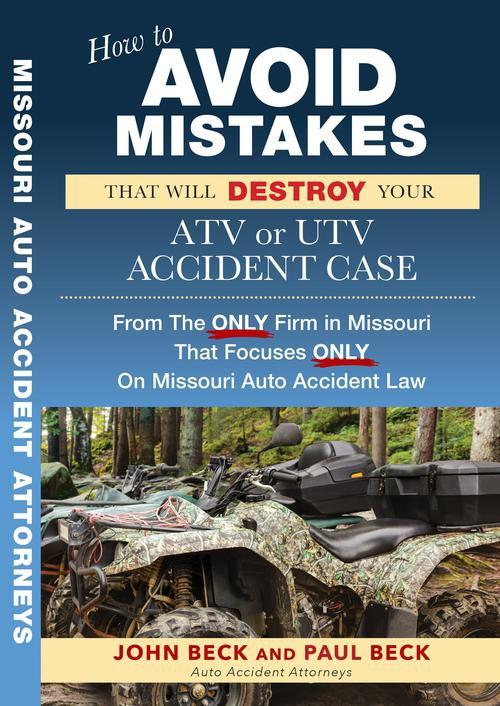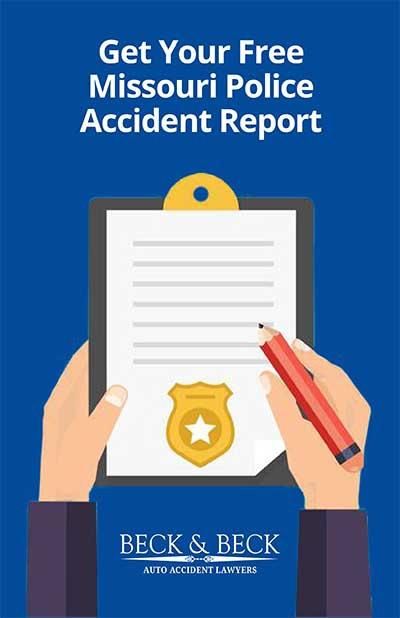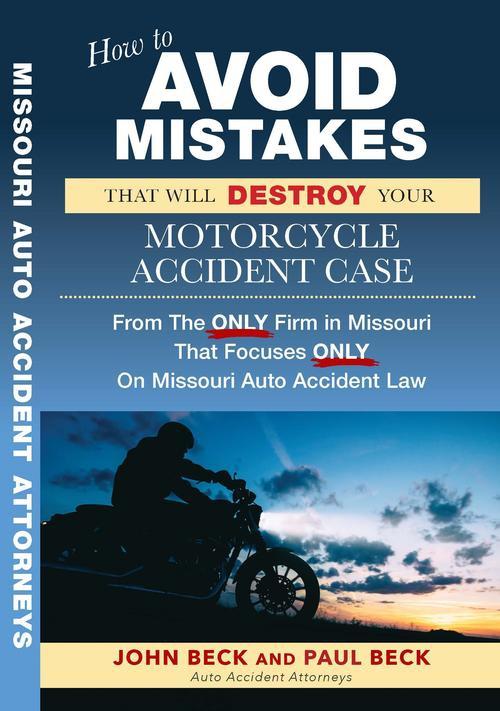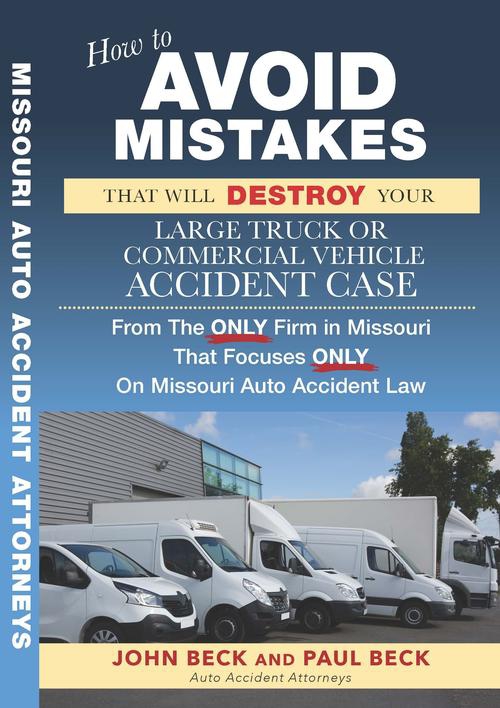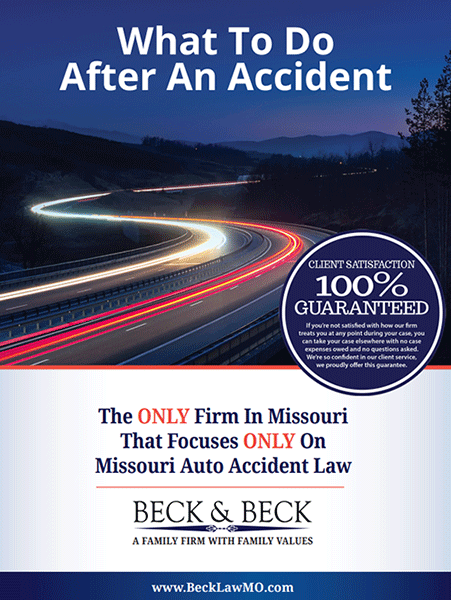What does a car accident lawyer do?
The role of our Missouri auto accident attorneys is to take the legal load off your shoulders so you can heal. From day one, we investigate the crash, preserve photos and videos, gather records, and speak with witnesses.
We build a complete damages picture—medical bills, lost income, future care, and the human impact—working with your doctors and, when needed, economic experts.
All insurer contact runs through us. We push for a fair settlement and don’t hesitate to file suit if they stall or underpay. In litigation, we handle discovery, motions, and trial prep.
Behind the scenes, we manage deadlines and paperwork, coordinate benefits (MedPay, health insurance), and deal with liens so you don’t pay twice.
Throughout, you get clear updates and straight answers. The goal is simple: full compensation with as little stress on you as possible.
Is there a time limit to file a car accident claim in Missouri?
Yes, Missouri gives you five years from the date of the crash to file a personal injury lawsuit. This is laid out under Missouri Revised Statutes Section 516.120.
If someone was killed in the accident and you’re filing a wrongful death claim, the time limit is only three years. It’s a hard deadline, and if you miss it, the court will likely throw your case out, no matter how strong it is. That’s why it’s smart to talk to a lawyer early.
At Beck & Beck Missouri Car Accident Lawyers, we handle these deadlines for you. We collect the evidence, deal with the insurance company, and file the right paperwork on time so you don’t have to worry about it.
You navigate these timelines and protect your rights; contact us for a free case evaluation.
How much Is my car accident claim worth?
Because every car accident is different, so there is no single answer to this. Value comes from evidence: the severity of your injuries, how long treatment lasts, whether you’ll need future care, time missed from work (and any limits on returning), and how the crash changed daily life.
Medical bills and wage loss set the economic floor; pain, limitations, and scarring affect non-economic damages. Property damage and insurance limits also matter.
We pull records, consult your doctors, and document future costs so the number reflects your real losses—not an adjuster’s estimate. Talk to us for a free case review.
What happens if I was partially at fault for the car crash?
Missouri uses pure comparative fault. You can still recover money, but it’s reduced by your share of blame. If you’re 20% at fault on a $50,000 case, you recover $40,000.
Insurers often try to inflate your percentage; we counter with evidence—photos, video, crash data, witness statements, and medical proof—to keep fault where it belongs.
Even if you think you made a mistake, don’t assume you’re out of options.
Are there ways to find a hit-and-run driver?
Yes, but finding a driver who fled the scene of an accident can be challenging. To start, report it immediately and give every detail you recall—make, model, color, unique damage/decals, direction of travel, and any plate digits.
Get witness names and numbers. Ask nearby businesses and homeowners to save camera footage (doorbell, dashcam) before it’s overwritten.
Our attorneys can coordinate a quick canvass, send preservation letters, and guide your claim.
Is it necessary to get medical attention after a car accident even if you feel okay?
Yes—get examined as soon as possible, even if you feel fine, since adrenaline and shock can mask concussions and soft-tissue injuries for hours or days.
Prompt treatment protects your health and creates the medical record that links your symptoms to the crash; when care is delayed or appointments are missed, insurers frequently argue the injuries aren’t related.
See a doctor, follow the treatment plan, and keep your visit summaries, test results, and prescriptions so your recovery—and your claim—are supported by clear documentation.
Are motorcycle riders in missouri required to wear helmets?
Missouri has a partial helmet law. Riders and passengers under 26 must wear a DOT-approved helmet.
Those 26 and older may ride without one only if they carry proof of health insurance coverage for motorcycle-injury medical bills (and meet financial responsibility rules); anyone on an instruction permit must wear a helmet regardless of age.
Police also may not stop a rider solely to check helmet compliance. Even when not required, a quality helmet sharply reduces head-injury risk.
What happens when a car accident in Missouri involves a fatality?
When a Missouri car crash is fatal, the family can bring a wrongful death claim. Although it doesn’t fill the void that the loved one left, it can be used to cover funeral and burial costs, final medical bills, the income and benefits your loved one would have provided, and recognition of the loss of companionship, guidance, and services at home.
Missouri law sets who may file: first a spouse, children (including a deceased child’s descendants), or parents; if none, a sibling or a sibling’s descendants; if no eligible family is available, the court can appoint a plaintiff ad litem.
The deadline is three years from the date of death. Acting sooner helps preserve evidence and eases the burden of dealing with insurers. We can handle the legal steps so you can focus on your family.
What is Missouri’s “No Pay, No Play” law?
Missouri’s “No Pay, No Play” law limits what uninsured drivers can recover after a crash. If you were driving without insurance and someone else hit you, you may not be able to collect money for pain and suffering, even if the other driver was completely at fault.
You can still recover for medical bills, lost wages, and damage to your car—but not for non-economic damages.
There are some exceptions. If the other driver was drunk, driving recklessly, or fleeing the police, the rule might not apply. Still, the law can seriously limit your options if you didn’t have insurance at the time.
That’s why it’s always a good idea to talk to a lawyer if you’re not sure where you stand. We’ll go over the details and explain what you can still recover.
Am I required to contact the police after a car crash in Missouri?
Yes—if anyone is hurt, there’s a death, or the damage likely tops $500, you should call 911 and report the crash. Missouri law requires police crash reporting in those situations, and many cities require drivers to notify the police “as soon as reasonably possible.”
A police report can also be key evidence for your claim.
If officers don’t respond, you may still have to file a written report with the Missouri Department of Revenue within 30 days in certain cases (for example, when an uninsured motorist is involved and there’s injury, death, or $500+ damage).
When in doubt, report the crash—and keep copies of the report and your claim paperwork. If you’re unsure whether your situation triggers a reporting requirement, we can review it and guide you.
When should I file my Missouri truck accident claim?
In Missouri, you have five years from the date of the accident to file a personal injury claim, including those involving semi-trucks or commercial vehicles. But don’t wait that long. These cases are complex, and trucking companies usually act fast to protect themselves.
Important evidence—like dash cam footage or maintenance records—can disappear if you don’t move quickly. It’s best to speak with a lawyer as soon as possible so we can secure the proof you’ll need.
We’ll look into what caused the crash, identify who’s responsible, and handle the claim while you recover. Time can make or break a truck accident case. Contact our award-winning attorneys at Beck & Beck Missouri Car Accident Lawyers for a free consultation. We’ll help you get started before any deadlines become a problem.
Can you sue for whiplash injuries after a car accident in Missouri?
Yes, you can file a claim or even sue for whiplash injuries after a crash in Missouri. Whiplash might seem like a minor injury, but it can cause long-term neck pain, headaches, or stiffness that affects your ability to work or go about your day.
If another driver caused the accident, you have the right to seek compensation for medical bills, lost income, and pain and suffering. That’s true even if the damage to your car wasn’t that bad—insurance companies sometimes try to downplay these claims, but we know how to push back.
The key is getting your injury documented by a doctor early and keeping track of how it’s affecting you.
How much is my Missouri bicycle accident claim worth?
There’s no preset number for the value of a bicycle accident claim in Missouri. Value turns on the evidence—how serious your injuries are, what treatment costs now and later, time off work, and any lasting limits or scarring (bike and gear losses count, too).
Missouri’s pure comparative fault rule reduces recovery by your share of blame, and policy limits and proof quality matter. Strong medical records and photos/witnesses raise leverage.
We can review your file and give a realistic range in a free consultation.
Who can be held liable for truck accident injuries in Missouri?
Fault often extends beyond the driver. Depending on the facts, liability may fall on:
- the driver (speeding, distraction, hours-of-service violations);
- the motor carrier (vicarious liability;
- negligent hiring, training, or supervision;
- unsafe dispatch; poor maintenance);
- the trailer owner, shipper, or cargo loader (overweight or unsecured loads);
- a maintenance contractor or repair shop; a parts or vehicle manufacturer (defective brakes, tires, or steering);
- other motorists who triggered the collision;
- or, in some cases, a road contractor or public entity for a dangerous work zone.
Pinpointing responsibility takes targeted proof—ELD/ECM downloads, driver logs, GPS and dispatch data, bills of lading, scale tickets, maintenance files, and camera footage.
Our experienced Missouri truck accident attorneys run that full investigation and pursue every accountable party to maximize your recovery.
How is liability proven in a motorcycle accident claim?
Proving liability in a motorcycle accident starts with showing the other driver was careless or reckless. That might mean they turned in front of you, failed to yield, or were distracted at the time of the crash.
Our attorneys look at police reports, skid marks, damage to the vehicles, and any traffic or security camera footage that might help tell the story. Witnesses can also be useful.
At Beck & Beck Missouri Car Accident Lawyers, we work with accident reconstruction experts when needed to prove how the crash happened. We also push back if the other side tries to claim you were at fault just because you were on a motorcycle.
That kind of bias happens more often than it should. We build a strong case based on the facts and fight to hold the right party accountable.
Can I handle my own truck accident claim in Missouri or should I hire a lawyer?
You can try, but it’s risky. Truck cases aren’t ordinary car claims. They involve federal safety rules, multiple potential defendants, and evidence that can disappear fast—driver logs, ELD/ECM data, dispatch records, maintenance files, and camera footage.
Insurers move quickly to shape the story and limit what they pay. One recorded statement, a broad medical release, or a missed deadline can undercut a strong case.
A truck accident lawyer preserves proof with immediate spoliation letters, identifies every liable party (driver, motor carrier, loader/shipper, maintenance, and manufacturers), and documents the full scope of your losses—medical care now and in the future, wage loss, and daily-life impact.
We also coordinate benefits and negotiate liens so you don’t pay twice. If the carrier won’t deal fairly, we file suit.
Bottom line: counsel levels the field and protects the value of the claim. If you’re unsure where you stand, a free consultation will give you a clear plan.
Can you sue a drunk driver for car accident injuries?
Absolutely. A driver who causes a crash while impaired can be held civilly liable, separate from any criminal case. You can pursue compensation for medical care (past and future), lost wages, vehicle repair or replacement, and pain and suffering.
In egregious cases, courts may also award punitive damages to punish reckless conduct.
Strong evidence makes the difference: the police report, blood- or breath-test results, body-cam or dash-cam video, and witness statements.
My car was totaled in an accident that was not my fault. What do I do?
Start by opening claims with both insurers (yours and the at-fault driver’s) and get the police report number. Ask for a total-loss valuation and rental or loss-of-use coverage.
Move the vehicle out of paid storage to stop fees. Gather proof to support value—recent photos, maintenance records, options/packages, mileage, and comparable local listings.
Your payout should reflect the car’s actual cash value (pre-crash), plus applicable taxes and title/registration fees, minus your deductible if you use your own collision (your insurer will seek reimbursement).
If their number is low, negotiate with solid comps. If there’s a loan balance above the payout, check for GAP coverage; if none, talk with your lender about the shortfall.
You can often keep the salvage for a reduced payout if you want the vehicle. Property damage is separate from any injury claim—don’t sign a global release if you’re still treating.
If the carrier drags its feet or undervalues the car, we can step in, press the timeline, and handle the negotiation.
Someone stole my car and got into an accident. Am I responsible for covering the damages?
If your car was stolen in Missouri and the thief crashed it, you’re generally not liable for the damages. Report the theft to police and your insurer immediately to document that the use was non-permissive.
Liability issues can arise only if the driver actually had permission or if there’s negligent entrustment (for example, handing keys to an unlicensed or impaired driver).
Coverage usually follows the car only when the driver had permission. In a true theft, your liability insurance typically doesn’t pay for third-party claims, while your own collision/comprehensive may cover your vehicle (minus the deductible).
If this happened to you, we can review the report and your policy and explain your options in a free consultation.
I was in a minor car accident in Missouri—do I need a lawyer?
It depends. If the accident was minor, no one was hurt and there’s no dispute about fault, you might be able to handle it on your own. But if you’re feeling sore, even a little, or you’re unsure what your car is worth, it’s worth having a lawyer look at it. Some injuries don’t show up right away.
The insurance company may also try to close the case fast with a low offer. Once you take it, there’s no going back. At Beck & Beck Missouri Car Accident Lawyers, we’ll review everything during a free consultation.
We’ll tell you if it makes sense to handle it alone or if we can help you recover more. Either way, you’ll get honest guidance before making a decision.
Are there rules and regulations for truck drivers in Missouri?
Missouri truck drivers must adhere to federal and state regulations to ensure road safety. Federally, the Federal Motor Carrier Safety Administration (FMCSA) sets standards on driver qualifications, service hours, vehicle maintenance, and safety protocols.
Missouri also enforces specific rules, including vehicle safety inspections and driver qualification standards. Non-compliance with these regulations can make drivers and trucking companies liable for accidents.
What are pedestrians’ rights in Missouri?
In Missouri, pedestrians do have specific rights under the law, but they also have responsibilities. If you’re crossing at an intersection or using a marked crosswalk, drivers must yield and use care to avoid hitting you.
Even outside of those areas, drivers still have a duty to avoid a collision if possible. That said, pedestrians also need to follow traffic signals and avoid stepping into traffic when it’s unsafe.
A lot of cases we see involve drivers who were speeding, distracted, or just not paying attention. If that’s what caused your injury, you may have a claim.
We’ve helped pedestrians recover money after being hit while walking in parking lots, crossing the street, or even standing on the sidewalk. If you were hurt and aren’t sure what your rights are, we can explain how the law works and what you may be entitled to.
Who covers medical bills when the at-fault driver in a Missouri car accident is uninsured?
If you’re hit by someone who doesn’t have insurance, your own uninsured motorist (UM) coverage can step in to help. In Missouri, this type of coverage is required in every auto policy, so if you’ve got insurance, you likely have UM. It’s meant to cover your medical bills, lost wages, and other damages when the other driver can’t.
It’s frustrating, especially when the crash wasn’t your fault, but this coverage is there to protect you in exactly this kind of situation.
Sometimes, there are other options too—if another party contributed to the crash or if you have medical payments (MedPay) coverage, that could help as well. Our firm looks at every possible source of coverage so nothing gets missed.
If you’re feeling overwhelmed by the bills and not sure what your next step should be, call us. We’ll explain what your options are, free of charge.
I was in a motorcycle accident that wasn’t my fault. Will the fact that I wasn’t wearing a helmet affect my chances of getting compensation?
You can still pursue compensation. Missouri uses comparative fault, so not wearing a helmet doesn’t bar your claim, but it can reduce only those damages tied to head or face injuries if the insurer proves a helmet would have lessened them. It won’t matter for unrelated injuries (e.g., a broken leg).
Additionally, Missouri’s partial helmet law (riders 26+ may ride without a helmet with qualifying insurance) is about traffic rules, not civil damages. Even if riding bareheaded were legal, insurers may still argue mitigation for head injuries.
How long will it take my Missouri car accident claim to settle?
It depends on your recovery and how clear fault is. Property-damage-only claims can resolve in weeks; straightforward injury cases often settle in 3–6 months; cases with surgery or disputed liability can run 6–12+ months because we usually wait for MMI to value future care.
Insurers often finish investigations in about a month once they have records. We’ll keep the process moving and push to settle as soon as the medical picture is clear.
After being involved in an accident with a semi-truck, I’ve been unable to work. Is there a way to recover lost wages?
Yes. If you can’t work because of injuries from a semi-truck crash, you can claim lost wages—the pay you would have earned while you recover. If your injuries affect your ability to work in the future, you may also seek future lost income.
To support your claim, it is important to keep simple records: recent pay stubs, a doctor’s note about work restrictions, and a short letter from your employer confirming missed days and usual hours.
We can gather the paperwork and deal with the insurer so you’re paid what you’re owed.
How can a Missouri truck accident lawyer help with my claim?
Truck accident claims aren’t like regular car accident cases. There’s more at stake, and there are usually more people involved—like the trucking company, their insurer, and sometimes even the truck’s manufacturer or maintenance provider.
That means there’s a lot of back-and-forth, and these companies don’t make it easy.
When we take on a truck accident case, we start by collecting evidence fast. We get black box data, dashcam footage if it exists, and the driver’s logs.
We also look into the trucking company’s background to see if they’ve been cutting corners. Our job is to prove what happened and hold the right people accountable.
If you’re recovering from injuries, you shouldn’t have to deal with all that on your own. We take care of it so you can focus on healing. Reach out for a free case evaluation—we’re here to help you make sense of it all.
What is a medical lien?
A medical lien is a provider’s legal claim on your injury settlement. If a hospital, doctor, or clinic treats you without full payment up front, they can ask to be paid directly from any settlement or verdict you later receive.
Health insurers and government programs can assert similar repayment rights for bills they covered.
Liens make sure medical bills get paid, but they also reduce what you take home. We manage them from start to finish—confirm the lien is valid, limit it to crash-related charges, apply any contract or legal discounts, and negotiate reductions.
We also coordinate MedPay and health insurance payments so you don’t pay twice. The goal is simple: resolve your medical balances and maximize your net recovery.
Why choose Beck & Beck Missouri Car Accident Lawyers?
At Beck & Beck Missouri Car Accident Lawyers, motor vehicle accident law isn’t just one thing we do—it’s all we do.
Since 1990, we’ve focused on helping people hurt in crashes across Missouri. That focus matters. It means we know what to expect from insurance companies, how to build strong cases, and how to guide our clients through every step.
We don’t hand off your case to a junior attorney or treat you like a number. You’ll talk to real lawyers who handle your case directly. We offer free consultations, and we don’t get paid unless we win. If you’ve been injured in a crash and want someone in your corner, we’re ready to help you get started.
How can your Missouri auto accident law firm assist with my claim?
From day one, the goal is simple: protect your claim while you focus on getting better. We secure evidence (police reports, photos, 911 and camera footage, witness statements), handle all insurer contact, and stop recorded-statement traps.
Your medical records, bills, and wage loss are organized into a clear damages package; we also coordinate benefits and negotiate medical liens so you don’t pay twice.
When liability is disputed, we dig deeper—scene analysis, expert input, and timelines that show exactly how the crash happened.
Then we push for a fair settlement. If the carrier won’t deal straight, we file suit and take the case through litigation.
You’ll get regular updates and plain-English answers. Consultations are free, and you owe no attorney’s fee unless we win.
Is motorcycle lane-splitting illegal in Missouri?
Lane-splitting isn’t banned under Missouri law. No specific statute makes it illegal, but that doesn’t mean it’s always a good idea, as it can be risky, especially in heavy traffic where drivers aren’t expecting a motorcycle to pass between lanes.
If an accident happens while you’re lane-splitting, the insurance company might argue you were partly to blame. Missouri follows a comparative fault rule, which means your compensation can be reduced if they decide you share some of the responsibility.
That said, you’re still allowed to file a claim. Your right to recover damages depends on the facts of the crash, not just whether you were lane-splitting.
If you’ve been in an accident and have questions about how this could affect your case, we offer free consultations and can help you understand where you stand.
What happens when the at-fault driver flees the scene of the accident without exchanging information?
A hit-and-run crash is a serious offense in Missouri, and it can leave you in a tough spot—especially if the driver isn’t caught. Even so, you still have options. Your uninsured motorist coverage should apply, since the at-fault driver is essentially considered “uninsured” if their identity is unknown.
The key is reporting the crash right away and documenting what you can. That means calling the police, getting witness names, checking for nearby cameras, and taking pictures of the damage.
The sooner we act, the better our chances of tracking down the driver—or building a strong uninsured claim. These cases aren’t easy, but we’ve handled many just like it. Let us step in and guide you through it so you don’t have to face it alone.
What should I do immediately after a motorcycle accident in Missouri?
- Get safe and call 911. Ask for police and a medical check—even if you feel okay.
- Document the scene. Take wide and close photos of vehicles, skid marks, road/lighting/weather, your injuries, and damaged gear. Note nearby cameras. Get witness names and numbers.
- Exchange info—don’t argue. Collect the other driver’s name, plate, insurer, and policy number. Don’t admit fault or guess what happened.
- Preserve evidence. Keep your helmet, gear, and bike as-is; save the dashcam video. Note the tow/storage location. Ask for the report or incident number.
- See a doctor the same day and follow orders. Keep visit summaries and start a brief symptom journal.
- Notify your insurer, but decline a recorded statement to the other driver’s insurer; direct them to your attorney.
If you’re unsure about next steps, call Beck & Beck Missouri Car Accident Lawyers for a free case review.
What evidence will help strengthen my car accident claim?
Strong evidence makes all the difference in a car accident case. The more documentation you have, the easier it is to prove fault and recover fair compensation. We advise clients to gather:
- Photos of the vehicles, damage, and the scene
- Police report and crash number
- Medical records that show your injuries and treatment
- Witness statements and contact information
- Insurance details from the other driver
- Repair estimates or total loss reports for your vehicle
Even small details can matter, like road signs or skid marks that point to what happened. If you were too injured to collect any of this, we can step in and track it down.
Our team has handled hundreds of accident claims in Missouri, including Jefferson City, and we know how to build a case that holds up. Contact us—we’ll help gather what you need.
Can a passenger in a rideshare accident sue the driver?
As a passenger, you can bring a claim against whoever caused the crash—the rideshare driver, the other driver, or both. During an active Uber/Lyft trip, there’s typically up to $1,000,000 in liability coverage, and uninsured/underinsured motorist coverage may also apply if the at-fault driver lacks insurance.
Those protections sit alongside any at-fault driver’s personal policy.
Report the crash through the app and to police, get medical care, and keep your records. Before any recorded statement, talk to a lawyer.
We’ll secure evidence, identify every available policy, and handle the claim while you focus on recovery.
Totaled Vehicle and Diminished Value FAQ
If another driver caused my crash, am I still responsible for making my car loan payment if it is totaled or being repaired
Yes, you remain legally responsible for making your car loan payments even if another driver caused the crash. A car loan is a binding financial contract between you and your lender, independent of fault for an accident.
The at-fault driver’s insurance company is obligated to compensate you for the property damage and losses caused by the accident—up to the vehicle’s actual cash value (ACV) at the time of the crash, or up to the limits of their policy.
What happens if I owe more to the car loan company than my car is worth?
If your car is totaled and the ACV payout doesn’t cover the full remaining balance on your loan, you are still responsible for paying the remaining amount. The insurer for the at-fault driver is only required to compensate for the market value of the vehicle—not the entire loan balance.
Check to see if you purchased Gap Insurance through your car insurance company, your car loan company or another insurance company. You may have been required to purchase Gap Insurance, as that is sometimes required by the car loan company.
This type of insurance pays the difference between your loan balance and the Actual Cash Value payment paid by the at-fault driver’s insurance.
Why was my car towed after the accident?
If your vehicle was damaged to the point it couldn’t be safely driven, law enforcement or the responding officers likely ordered it towed to clear the roadway. The tow company will take it either to their impound lot or a designated storage facility.
Who pays for the towing charges?
The at-fault driver’s insurance is typically responsible for covering towing fees. You may need to pay the cost upfront to retrieve your car, but you can request reimbursement from the at-fault driver’s insurer later.
How can I get my personal belongings from the towed vehicle?
Contact the tow lot to schedule a time to retrieve your personal belongings. Bring identification and proof of ownership (such as your vehicle registration, insurance card or title).
You can take out personal items, but the lot may not allow you to remove parts of the vehicle itself.
Can my insurance handle the towing and storage directly?
Yes. If you have collision coverage, your insurer may pay the costs upfront and seek reimbursement from the at-fault driver’s insurance company later.
How do I find out where my car was towed?
If you’re unsure, call the law enforcement agency that responded to your crash. They can provide the towing company’s name, phone number, and address.
Should I notify my insurance company about towing and storage?
Yes. Notify your insurer immediately so they can communicate with the tow lot, the other driver’s insurer, and arrange next steps for your claim and vehicle.
What happens if the at-fault driver’s insurer delays payment?
You may need to pay to recover your vehicle, then seek reimbursement through the at-fault driver’s insurance. Keep all receipts for towing, storage, and related costs.
Who pays for my car repairs after the accident?
The at-fault driver’s insurance is normally responsible for the cost of repairs. Their insurer should inspect your vehicle, approve an estimate, and pay the repair shop directly or reimburse you for covered costs.
What if my car needs repairs immediately, but their insurance is delaying the claim?
If the other driver’s insurer is taking too long, you can use your own collision coverage (if you have it) to get repairs started sooner.
Your insurance company will then seek reimbursement from the at-fault driver’s insurer through subrogation. Your insurance will return your deductible when they are reimbursed.
Can I choose my own repair shop?
Yes. In Missouri, you have the right to choose where your car is repaired. The other party’s insurer may recommend preferred shops, but you are not required to use them.
However, insurers are only required to pay a reasonable amount for repairs and parts, so if your chosen shop charges above the prevailing market rate, you may be responsible for the difference
What if the repair estimate seems too low?
You may request an independent estimate from your own mechanic or body shop. If there’s a dispute, your insurance adjuster can negotiate with the at-fault driver’s insurer or refer the issue to arbitration.
What happens if my car is declared a total loss?
If repairs exceed the car’s actual cash value (ACV), or 75% of it, the insurer may “total” it. You’ll receive a settlement based on the vehicle’s pre-crash market value. The at-fault driver’s insurer usually handles this if liability is clear.
You can negotiate if you disagree with the valuation — providing maintenance records and listing comparable local sale prices often helps.
At Beck & Beck Missouri Car Accident Lawyers, we are the only law firm in Missouri with access to a new proprietary software which allows us to more effectively challenge the values the insurance companies assign to these ‘totaled’ vehicles, whereby putting more money in your pocket.
Can I get a rental car while mine is being fixed?
Yes. If the other driver’s insurance accepts fault, they should cover a rental vehicle for a reasonable period while your car is in repair. If they delay, your own policy may also provide rental coverage if you opted for it.
Does the other insurer have to use original manufacturer (OEM) parts for repairs?
Not necessarily. In Missouri, insurance companies are only required to use equivalent-quality parts unless OEM parts are explicitly required by the vehicle’s warranty or manufacturer. You can ask your adjuster if OEM parts can be specified for safety or warranty reasons.
If a repair will use non-OEM crash parts (those not made by the vehicle’s original manufacturer), the repair estimate must state this clearly before work begins.
You, as the vehicle owner, may request OEM parts, but if they cost more than equivalent aftermarket parts, the insurer usually only pays the reasonable market rate—you’d be responsible for the difference unless your policy or the at-fault insurer agrees otherwise
What can I do if the at-fault driver’s insurer denies my claim?
You can have your own insurer handle payment under your collision coverage (If you paid for it on your policy) and let them pursue the at-fault insurer. If your claim is still denied, you should consult an attorney specializing in auto accident cases.

